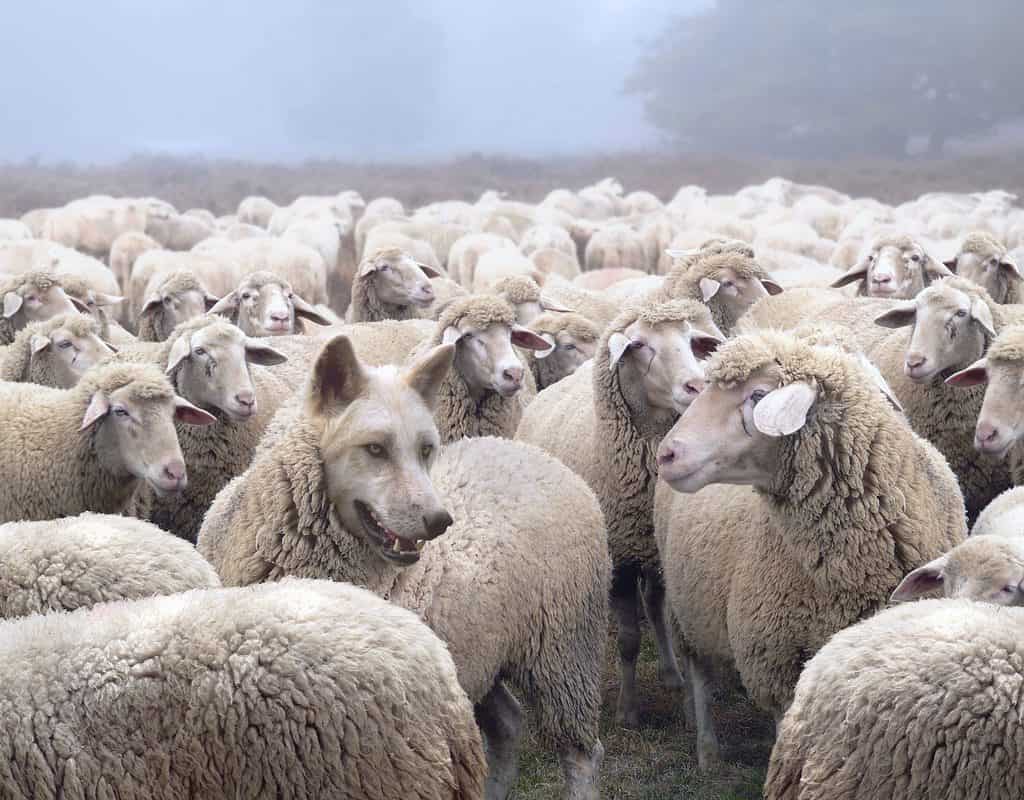The phrase “a wolf in sheep’s clothing” is often meant to mean something threatening that is disguised as something harmless. It could mean that a predator is in the crowd or that a coworker or friend is playing nice but really has nefarious intentions. Where does this phrase come from and when was it first used? Keep reading to find out more about this common idiom in the English language.
Origins of the Phrase “A Wolf in Sheep’s Clothing”
Like many idioms in the English language, this one has a biblical origin. It comes from the New Testament, the Bible that many Christian denominations use for worship. It comes from the section known as the Sermon on the Mount, which is verse 7:15 in the Gospel of Matthew. From the King James translation of the Bible, the quote is: “Beware of false prophets, which come to you in sheep’s clothing, but inwardly they are ravening wolves.” The rest of the sermon suggests that it’s important to pay attention to people’s actions to identify people who are these wolves in sheep’s clothing.
However, some experts suggest this idea may have originated before Biblical times in a fable by the famed Aesop. Aesop’s Fables are a series of stories passed down through the ages from the years between 520 and 564 BCE in Ancient Greece before the Bible was written. They were told by Aesop, a slave and famed storyteller who lived during that time. Each story has a lesson that can be applied to everyday life.
In one of his fables, a wolf wears a sheepskin so that he can get access to a tasty-looking flock. Unfortunately, the wolf gets penned in with the sheep and that night the farmer decides to choose a sheep to have some mutton for dinner. That night, the wolf meets his end. So, while this tale has a slightly different lesson than the phrase “a wolf in sheep’s clothing” it contains the same concept.

The phrase “a wolf in sheep’s clothing” is often meant to mean something threatening that is disguised as something harmless.
©funstarts33/Shutterstock.com
Examples of Everyday Use of the Phrase “a Wolf in Sheep’s Clothing”
This phrase can be used in many scenarios. It’s something that can be applied anytime you have people interacting because there is always the possibility for someone to have an ulterior motive. You can use it at work, in a friend group, in politics, and anytime people are gathered together. For example, you could say that someone who just wants to become friends with someone to learn more gossip about them or take advantage of them in some way is “a wolf in sheep’s clothing.”
Things that seem harmless but could actually be harmful could also be a wolf in sheep’s clothing. For example, you might say to someone who is trying to watch what they eat that salad dressing can be a wolf in sheep’s clothing because it can have so many calories, turning a seemingly low-calorie salad into something that might not fit their diet plan.
Additionally, this phrase is used in the animal world to describe certain species that are neither wolves nor sheep. Some predatory insects like jumping spiders and orchid mantises have the ability to mimic other insects to lure their prey into feeling comfortable before they attack. Some fish and birds also do this.

Someone who just wants to become friends to learn gossip or take advantage of them in some way is “a wolf in sheep’s clothing.”
©Prathankarnpap/Shutterstock.com
A Useful Way to Illustrate the Phrase “A Wolf in Sheep’s Clothing”
Here is a fictional scenario to help you see when you might use the phrase “a wolf in sheep’s clothing.”
Imagine that you are shopping for a car. At one dealership the salesperson is very nice. He brings you coffee and makes you feel comfortable. He tells you that there is only one left of the kind of car you want and if you want to buy it the payments will be $500 per month despite the fact that you told him your budget is $300 per month.
You decide to shop around and go to a different dealership of the same brand of cars. There you find the car you want at $200 per month and the salesperson at this dealership tells you that this car is actually on special at all the dealerships in the state. The first salesperson would be a wolf in sheep’s clothing – he seemed nice, but he was trying to take advantage of you!

Beware of dishonest salespeople who may seem nice but are trying to take advantage of you.
©iStock.com/sumnersgraphicsinc
A Real-Life Example from the News
In 2019, a congresswoman from Florida, Debbie Wasserman-Schulz called the governor at the time, Rick Scott, a wolf in sheep’s clothing. The dispute was about whether or not he really supported Venezuelans who were coming to the US and wanted to qualify for a temporary protected status due to difficult political conditions in Venezuela. Wasserman-Schulz felt that Rick Scott’s support of Venezuelan immigrants to the US was an empty gesture because his suggested measures would only offer Venezuelans this status in the US for 18 months, so she used this phrase to describe her thoughts about him at that time.
Possible Pros and Cons of Using the Phrase “A Wolf in Sheep’s Clothing”
This phrase would be offensive if used towards someone directly. It would basically be accusing someone of not being genuine. Additionally, if you use it to talk about an object to warn someone about something, you could still offend. Some people don’t take it well if it is suggested that there is some threat they are not seeing.
However, it is a good phrase to describe something that could be an unpredicted threat or something that seems helpful but is actually harmful. You must use it with care and in the right company.
Phrases With a Similar Meaning to “A Wolf in Sheep’s Clothing”
There are a few phrases that have a similar meaning to the idiom “a wolf in sheep’s clothing” but perhaps with a slightly different flavor. Always look up the full meaning of any idiom before you use it if you’re not 100% sure of the meaning!
- “A snake in the grass”
- “A devil in disguise”
Up Next
Thank you for reading! Have some feedback for us? Contact the AZ Animals editorial team.








